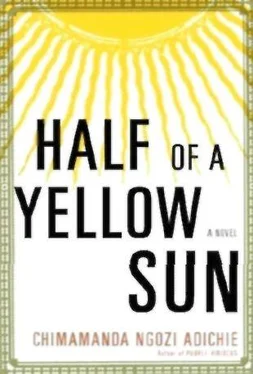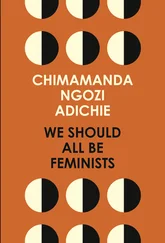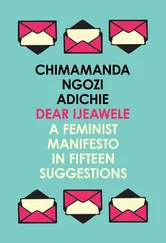Ngozi Adichie Chimamanda
Half of a Yellow Sun
My grandfathers, whom I never knew,
Nwoye David Adichie and Aro-Nweke Felix Odigwe,
did not survive the war.
My grandmothers, Nwabuodu Regina Odigwe and Nwamgbafor Agnes Adichie, remarkable women both, did.
This book is dedicated to their memories: ka fa nodu na ndokwa.
And to Mellitus, wherever he may be.
Today I see it still-
Dry, wire-thin in sun and dust of the dry months-
Headstone on tiny debris of passionate courage.
— Chinua Achebe,
From «Mango Seedling» in Christinas in Biafra and Other Poems
PART ONE. The Early Sixties
Master was a little crazy; he had spent too many years reading books overseas, talked to himself in his office, did not always return greetings, and had too much hair. Ugwu's aunty said this in a low voice as they walked on the path. «But he is a good man,» she added. «And as long as you work well, you will eat well. You will even eat meat every day.» She stopped to spit; the saliva left her mouth with a sucking sound and landed on the grass.
Ugwu did not believe that anybody not even this master he was going to live with, ate meat every day. He did not disagree with his aunty, though, because he was too choked with expectation, too busy imagining his new life away from the village. They had been walking for a while now, since they got off the lorry at the motor park, and the afternoon sun burned the back of his neck. But he did not mind. He was prepared to walk hours more in even hotter sun. He had never seen anything like the streets that appeared after they went past the university gates, streets so smooth and tarred that he itched to lay his cheek down on them. He would never be able to describe to his sister Anulika how the bungalows here were painted the color of the sky and sat side by side like polite well-dressed men, how the hedges separating them were trimmed so flat on top that they looked like tables wrapped with leaves.
His aunty walked faster, her slippers making slap-slap sounds that echoed in the silent street. Ugwu wondered if she, too, could feel the coal tar getting hotter underneath, through her thin soles. They went past a sign, Odim street, and Ugwu mouthed street, as he did whenever he saw an English word that was not too long. He smelled something sweet, heady, as they walked into a compound, and was sure it came from the white flowers clustered on the bushes at the entrance. The bushes were shaped like slender hills. The lawn glistened. Butterflies hovered above.
«I told Master you will learn everything fast, osiso-osiso» his aunty said. Ugwu nodded attentively although she had already told him this many times, as often as she told him the story of how his good fortune came about: While she was sweeping the corridor in the mathematics department a week ago, she heard Master say that he needed a houseboy to do his cleaning, and she immediately said she could help, speaking before his typist or office messenger could offer to bring someone.
«I will learn fast, Aunty,» Ugwu said. He was staring at the car in the garage; a strip of metal ran around its blue body like a necklace.
«Remember, what you will answer whenever he calls you is Yes, sah!»
«Yes, sah!» Ugwu repeated.
They were standing before the glass door. Ugwu held back from reaching out to touch the cement wall, to see how different it would feel from the mud walls of his mother's hut that still bore the faint patterns of molding fingers. For a brief moment, he wished he were back there now, in his mother's hut, under the dim coolness of the thatch roof; or in his aunty's hut, the only one in the village with a corrugated iron roof.
His aunty tapped on the glass. Ugwu could see the white curtains behind the door. A voice said, in English, «Yes? Come in.»
They took off their slippers before walking in. Ugwu had never seen a room so wide. Despite the brown sofas arranged in a semicircle, the side tables between them, the shelves crammed with books, and the center table with a vase of red and white plastic flowers, the room still seemed to have too much space. Master sat in an armchair, wearing a singlet and a pair of shorts. He was not sitting upright but slanted, a book covering his face, as though oblivious that he had just asked people in.
«Good afternoon, sah! This is the child,» Ugwu's aunty said.
Master looked up. His complexion was very dark, like old bark, and the hair that covered his chest and legs was a lustrous, darker shade. He pulled off his glasses. «The child?»
«The houseboy, sah.»
«Oh, yes, you have brought the houseboy. / kpotago ya.» Master's Igbo felt feathery in Ugwu's ears. It was Igbo colored by the sliding sounds of English, the Igbo of one who spoke English often.
«He will work hard,» his aunty said. «He is a very good boy. Just tell him what he should do. Thank, sah!»
Master grunted in response, watching Ugwu and his aunty with a faintly distracted expression, as if their presence made it difficult for him to remember something important. Ugwu's aunty patted Ugwu's shoulder, whispered that he should do well, and turned to the door. After she left, Master put his glasses back on and faced his book, relaxing further into a slanting position, legs stretched out. Even when he turned the pages he did so with his eyes on the book.
Ugwu stood by the door, waiting. Sunlight streamed in through the windows, and from time to time a gentle breeze lifted the curtains. The room was silent except for the rustle of Master's page-turning. Ugwu stood for a while before he began to edge closer and closer to the bookshelf, as though to hide in it, and then, after a while, he sank down to the floor, cradling his raffia bag between his knees. He looked up at the ceiling, so high up, so piercingly white. He closed his eyes and tried to reimagine this spacious room with the alien furniture, but he couldn't. He opened his eyes, overcome by a new wonder, and looked around to make sure it was all real. To think that he would sit on these sofas, polish this slippery-smooth floor, wash these gauzy curtains.
«Kedu afa gi? What'syour name?» Master asked, startling him.
Ugwu stood up.
«What's your name?» Master asked again and sat up straight. He filled the armchair, his thick hair that stood high on his head, his muscled arms, his broad shoulders; Ugwu had imagined an older man, somebody frail, and now he felt a sudden fear that he might not please this master who looked so youthfully capable, who looked as if he needed nothing.
«Ugwu, sah.»
«Ugwu. And you've come from Obukpa?»
«From Opi, sah.»
«You could be anything from twelve to thirty.» Master narrowed his eyes. «Probably thirteen.» He said thirteen in English.
«Yes, sah.»
Master turned back to his book. Ugwu stood there. Master flipped past some pages and looked up. «Ngwa, go to the kitchen; there should be something you can eat in the fridge.»
«Yes, sah.»
Ugwu entered the kitchen cautiously, placing one foot slowly after the other. When he saw the white thing, almost as tall as he was, he knew it was the fridge. His aunty had told him about it. A cold barn, she had said, that kept food from going bad. He opened it and gasped as the cool air rushed into his face. Oranges, bread, beer, soft drinks: many things in packets and cans were arranged on different levels and, and on the topmost, a roasted shimmering chicken, whole but for a leg. Ugwu reached out and touched the chicken. The fridge breathed heavily in his ears. He touched the chicken again and licked his finger before he yanked the other leg off, eating it until he had only the cracked, sucked pieces of bones left in his hand. Next, he broke off some bread, a chunk that he would have been excited to share with his siblings if a relative had visited and brought it as a gift. He ate quickly, before Master could come in and change his mind. He had finished eating and was standing by the sink, trying to remember what his aunty had told him about opening it to have water gush out like a spring, when Master walked in. He had put on a print shirt and a pair of trousers. His toes, which peeked through leather slippers, seemed feminine, perhaps because they were so clean; they belonged to feet that always wore shoes.
Читать дальше












